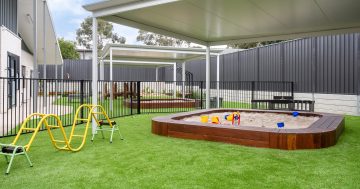
There is no denying that childcare is expensive in the ACT. A report released by the Productivity Commission last year found that Canberra parents pay some of the highest fees in the country. A quick look at the website www.mychild.gov.au this week reveals that parents are paying anywhere between $90 and $127 a day for long day care in the ACT. When this year’s report comes out in a few weeks, there will be no surprise if the ACT continues to be home to some of the highest childcare fees in Australia. While the Australian Government provides substantial subsidies around these costs, it is still a hefty hit to weekly family budgets.
Some Federal politicians have recently weighed into the debate, suggesting that it is the Government’s fault that the costs are so high, pointing to unnecessary regulation for a job that they see is primarily around ‘wiping noses’. They suggested that parents should have the choice to access childcare that is not subject to the Federal regulations or quality regulations.
It is true that childcare costs have been rising in recent years primarily due to the introduction the National Quality Framework. This framework introduced a few years ago is aiming to increase the quality of the care provided to our children. It insists that childcare workers either hold or are working towards a qualification, it imposes strict requirements on the delivery of age appropriate curriculum and ensures that facilities, food and equipment meet certain standards.
Its tempting to think that it’s just government redtape that is creating these high costs. However, what often gets lost in the discussion is what we are asking of our childcare workers. We are sharing the care, nurturing and education of our babies, toddlers and pre-schoolers with them. The evidence is overwhelming regarding the importance of the early years in terms of learning and development – there isn’t any time in our lives where we learn more, and creating environments that are safe, nurturing and educational is key to setting people up to be the best people they can possibly be. For many families, formal childcare is not a choice – its a necessity and the only way that we can operate in the modern world. For many children, formal childcare is a complement to what families can provide at home, and is important to their early development and care.
I have been a parent of childcare services as well as running a number of childcare services in Canberra. It’s hard work and the only ways it’s possible is because of the workers who have chosen this as their profession. They don’t do it for the money – the average childcare worker gets a similar pay rate to retail workers. It’s work that is physically and emotionally demanding. I have constantly been amazed by the professionalism, care, and love that workers have shown the children in their care. While working to ensure that services remain affordable is important, I also think it’s important to include in the discussion a recognition of the amazing work that our local childcare workers do and work to see how we can better value this.
Read the response of one childcare worker to calls for a relaxing of the regulation in the sector:
What do you think? Do you think that there should be a choice to have childcare that is not bound by the national regulations?




















